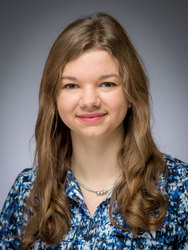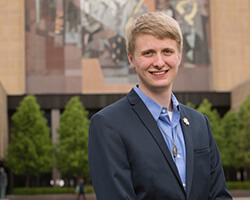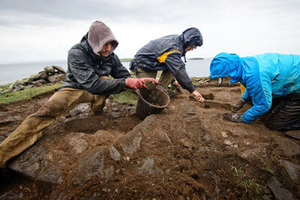Research and Internships
Research
Research opportunities abound for Medieval Studies majors and minors. Our students participate in and produce an impressive range of projects, part of the unique program of study they design around an area of concentration, and they have access to all the resources they need to help them.
Each year, the Medieval Institute hosts an Undergraduate Colloquium where students who have taken medieval studies courses present papers on a wide range of topics. Graduating seniors may also compete for the Robert M. Conway Prize (formerly the Michel Prize), a cash award that goes to the year’s best undergraduate essay on a medieval topic written at any point in the student’s academic career.
Students who major in Medieval Studies may be invited to participate in the Honors Track which provides an opportunity for increased study in Latin and a two-semester research project that culminates in an Honors Thesis. All majors have the option to write a senior research paper during their final year of study.
Resources
Want to start pursuing a research idea? Connect with the Flatley Center for Undergraduate Scholarly Engagement for guidance, faculty adviser recommendations, and funding options. For more research funding opportunities, see what the Undergraduate Research Opportunity Program in the College's Institute for Scholarship in the Liberal Arts has to offer. Every year, Arts and Letters students receive more than $250,000 in UROP grants alone.
Don't forget the Medieval Institute Library has an unparalleled collection of resources for the study of the Middle Ages. Contact the Medieval Studies Librarian, Dr. Julia Schneider (jschneid@nd.edu), for help.
Need additional help locating funding sources, or have questions? Contact Christopher Liebtag Miller (cmille34@nd.edu), Director of Undergraduate Studies.
Internships
Medieval Studies students may apply for a large number of summer internships. CUSE is a good resource for opportunities, along with Undergraduate Career Services. Undergraduates in Medieval Studies have secured internships in the University Archives, the Hesburgh Library Department of Special Collections and Rare Books, and at the Snite Museum of Art. For guidance and placement opportunities, contact Christopher Liebtag Miller (cmille34@nd.edu), Director of Undergraduate Studies.
Spotlights
Read more about the scholarly research and internships our outstanding undergraduates have engaged in.
John Sebastian Thörn '22: Aviation
Undergraduate Medieval Studies Minor and Business Major

Take a trip back to summer along with Medieval Studies minor John Sebastian Thörn (’22) to read about his internship with Alton Aviation in New York City and learn about how the Middle Ages has furthered his business career and this past summer's high-flying projects. Read more.
Erica Sestak '19: Rare Books and Special Collections
Medieval Studies Honors Major

In summer 2017, Erica Sestak was awarded a DaVinci Summer Grant from ISLA to carry out a multidisciplinary project of her proposal, using X-ray fluorescence and Raman spectroscopy to analyze pigments in medieval books. Her work was housed under a joint effort by Notre Dame's Nuclear Science Lab, Department of Physics; the Department of Chemistry and Biochemistry; and Rare Books and Special Collections. She now has a regular student job as a Curatorial Assistant for Prof. David Gura, Curator of Ancient and Medieval Manuscripts in Notre Dame's Rare Books and Special Collections. In this position, Erica uses her background in Latin and medieval studies to work with medieval, early printed, and modern collections and is learning different aspects of medieval studies, medieval bibliography, and work in Special Collections at a library. Read more.
Luke Donahue '17: Senior Honors Thesis
Medieval Studies Minor

Who is Mary, and what does she mean for us? How has her role developed over time? Luke Donahue ('17), a Medieval Studies minor, received a Break Travel and Research Grant for Sophomores and Juniors from the Nanovic Institute for European Studies to examine these questions by going back in time to a small but noteworthy cloister in medieval Germany. Luke developed this research into his undergraduate thesis, “Writing of Paradise: The Marian Prayers Composed by the Franciscan Tertiary Sisters of the Pütrich Regelhaus Found in Cgm 4484 and Their Historical Context.” For his work, he was awarded an Honorable Mention in the senior/honors thesis category of the Undergraduate Library Research Award (ULRA), which honors individuals who conduct original research and demonstrate exemplary skills through their broad use of library resources, collections and services for their scholarly and creative works. Sponsored by the Hesburgh Libraries and the Flatley Center for Undergraduate Scholarly Engagement, with support from other campus entities, the ULRA provides students with a network of support and offers inspiration to those beginning original research or capstone projects. Donahue, a German and theology double major with minors in Medieval Studies and the Arts and Letters Honors Program, was advised by Claire Taylor Jones, assistant professor of German. Read the full story...
Karen Neis '16: Senior Honors Project
Medieval Studies Honors Major
In 2016, Karen Neis produced as her senior honors project an illustrated children’s book, Abul Abbas, The Elephant. For her outstanding project, the Medieval Institute awarded Neis its annual Robert M. Conway Prize.
Yiren Shen '15: Senior Thesis
Medieval Studies Major

In his speech in Le Roman de la Rose, Faus-Semblant addresses a wide scope of issues such as immorality, problems in the medieval ecclesiastical institution, and people’s attitude towards clergymen. Chaucer, in borrowing from this speech, creates a series of vivid tales and characters that explore these same issues in The Canterbury Tales. In her senior thesis, "The voice lurking behind: Chaucer’s use of Faus-Semblant in The Canterbury Tales,” Shen examines how Chaucer uses the speech of this renowned hypocrite to mold his own stories and characters in the Tales—including the Pardoner, Friar Hubert, Friar John in the Summoner’s Tale, and even the Fiend and the summoner appearing in the Friar’s Tale. Read the essay.
Ryan Lash '10: Cultural Landscapes of the Irish Coast (CLIC) Project
Medieval Studies Honors Major and Anthropology Major

Ryan Lash’s involvement in research began right after his freshman year with the anthropology department’s Cultural Landscapes of the Irish Coast (CLIC) project, led by Ian Kuijt, associate professor of anthropology. Taking full advantage of Notre Dame resources that support undergraduate research and international study helped Lash establish an impressive academic track record at an early age. Funding from the Undergraduate Research Opportunity Program (UROP) allowed him to do fieldwork at Mesa Verde National Park in Colorado. The Nanovic Institute for European Studies funded Lash for travel in Britain and Ireland to write a paper on the link between medieval castle architecture and elite identity formation. He spent his junior year at New College in Notre Dame’s Oxford program studying medieval history, literature and archeology, and after graduating went to Cambridge as a Gates Scholar, where he studied the 200-year period in which Anglo-Saxon Britain became a Christian culture. Lash finished his Ph.D. in anthropology at Northwestern University and returned to Notre Dame as a 2021-2022 visiting fellow at the Irish Studies department.
According to Thomas Noble, professor emeritus of history and former director of Notre Dame’s Medieval Institute, “Ryan has blended his broad interests in the medieval world with specific interests in literature and material culture in sophisticated ways that belie his age and experience. He combines intelligence, a taste for hard work, and a disinterested love of learning with grace.”
FAQs
Can I get funding for a research project if I am an undergraduate in Medieval Studies? Yes, start by exploring the options available through the College of Arts and Letters. Check with CUSE (Center for Undergraduate Scholarly Engagement) for details. In addition, funds are sometimes available for undergraduate research through the Medieval Institute. Contact Director of Undergraduate Studies Christopher Liebtag Miller (cmille34@nd.edu) if you are interested in making a proposal.
Can I use the MI Reading Room to study in the evenings and on weekends? If you wish to use Reading Room materials between 8 a.m. and 5 p.m. on weekdays, no special permission is required. If you are working on a project for a medieval studies course that requires use of the materials after hours, you can request permission from the Medieval Studies Librarian, Dr. Julia Schneider (jschneid@nd.edu).
How do I get help finding a book or getting materials for a research project? The Medieval Studies Librarian, Dr. Julia Schneider (jschneid@nd.edu), can help you locate books and materials and answer research-related questions.
Can I check out books from the Medieval Institute’s non-circulating collection? If you are working on a research project and need a non-circulating book, see the Medieval Studies Librarian, Dr. Julia Schneider (jschneid@nd.edu), in the Reading Room. It might be possible to check out the book for a few days.
How does the Medieval Studies program recognize outstanding undergraduate research papers? You may enter a paper written for a Medieval Studies class in the Michel Prize competition, or you may wish to participate in the yearly Undergraduate Colloquium. For more information, contact Christopher Liebtag Miller (cmille34@nd.edu), Director of Undergraduate Studies.
Contacts
Christopher Liebtag Miller (cmille34@nd.edu)
Director of Undergraduate Studies
Medieval Institute
(574) 631-6081
Flatley Center for Undergraduate Scholarly Engagement
ISLA's Undergraduate Research Opportunity Program